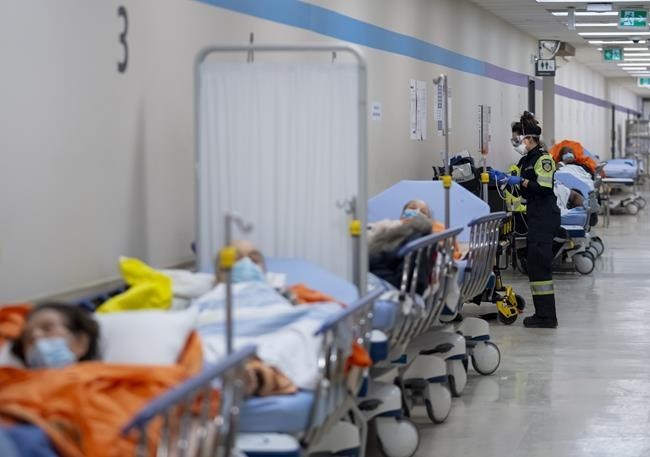TORONTO — A surge in hospitalizations for children that's expected to last months has prompted the agency overseeing Ontario's health system to direct general hospitals to accept patients 14 and older who need intensive care.
The move is necessary to ease pressure on overstretched pediatric hospitals, the chief medical director of Ontario Health said Thursday.
Surgeries may need to be cancelled to deal with the earlier-than-expected surge, Dr. Chris Simpson told The Canadian Press.Â
"This November and December and probably into January are going to be rough before this starts to settle down," he said.
Children's hospitalizations are being driven by influenza-like illness and respiratory syncytial virus, but not COVID-19, he said.Â
"I'm confident we have everything in place information-wise, and the way that we're organized to deal with it, but that doesn't make it any easier," Simpson said.
Another factor compounding problems is the countrywide shortage of children's Advil and Tylenol. "That's contributing to emergency department congestion," Simpson said.
He said respiratory viruses are nowhere near their peak, which is expected in mid-December.Â
"What's raising everybody's eyebrow is we're just entering respiratory virus season at a very high level," Simpson said.
Hospitals were informed of the Ontario Health directive via a memo sent Wednesday by the head of Ontario's critical care COVID-19 command centre.Â
Dr. Andrew Baker told hospital CEOs that the request for hospitals to take teen ICU patients, as well as a directive to maximize intensive care capacity to ease burdens on ERs, was made due to the "current and impending surge in pediatric critical care demand."
"It is anticipated that the next 2-3 months will bring significantly increased demands for pediatric critical care support that will be sustained and characterized by unplanned surges that may occur with very short lead time," Baker wrote.
Pediatric hospitals in Ontario have said recently they are being overwhelmed with children needing intensive care.Â
As of Tuesday, there were 107 children in critical care across the province, only four with COVID-19, data from Critical Care Services showed. That represented 95.5 per cent critical care bed occupancy across, Ontario.
The number of children in intensive care units jumped from 91 the day before.
Children are being hit hard by respiratory illnesses right now, statistics from Acute Care Enhanced Surveillance, a real-time Ontario-wide system that monitors hospital registration records, show.
There have been an average of 2,208 children visiting emergency departments over the last week in the province, compared to the historical seven-day average of 803 children.Â
Baker wants hospitals to "proactively create and sustain additional capacity in adult critical care." He also wants hospitals to "be available to respond within 24 hours to directives" from the command centre.
"We anticipate that (the request) may require hospitals to manage their resources and may result in the need to ramp down surgical/procedural volumes," Baker wrote.
Baker said the requests are temporary and correspond with the "predicted surge period" and will be reviewed every two weeks.
CHEO, a pediatric hospital in Ottawa, said its ICU and emergency department have been well overcapacity in recent days.Â
On Wednesday, it had 246 visits to the emergency department, which was built for 150 visits. By midday Thursday, the pediatric ICU was at 186 per cent capacity.
The hospital said it was seeing cases of COVID-19, RSV and the flu all at the same time.
"We are seeing (the three illnesses) all come together and there isn't that immunity that we usually see in older children, so we are seeing babies getting very sick," said Dr. Mona Jabbour, interim chief of the hospital's pediatrics department.
She said some adult hospitals are already taking children aged 14 and older, but that is not a solution to the pressures because the vast majority of patients are under five.Â
"We really need to do what we can to look after those children here because we really aren’t able to send them elsewhere," she said.
A hospital in north Toronto said it was seeing a surge in both adult and child illnesses.
Jhanvi Solanki, vice president of clinical programming at Humber River Hospital, said they don't usually see too many children needing hospitalization and would maybe see about seven at the most. But in recent weeks the hospital has been well over its 12-child capacity. On Thursday, 14 children were hospitalized, it said.
"How sick these children are is quite high," Solanki said. "Typically in community hospitals we don't see this degree of sickness, but we're seeing that now."
The hospital is also trying to deal with a surge in its medicine department, where many go after going to emergency.
"It's hitting the hospital from both ends," she said, adding the surge is mostly coming from the flu.Â
The hospital will now ramp up staffing to handle the surges, but that means it has to "scale down" in other areas, Solanki said.
There isn't much flex in the hospital system, said Dr. Michael Warner, director of the ICU at Michael Garron Hospital in Toronto.
"We're happy to help," Warner said, "but the Ontario health-care system on its best days runs close to a hundred per cent capacity."
He said treating teenagers is different than adults.
"Never in my life have I taken care of a 14 year old," he said. "Are they likely similar to an 18 year old if they've got the same disease? Yeah. And can I do it safely? Yeah. I should be able to."
But the interaction is different with parents at the bedside and there are crucial differences for life support, he said.
"Significant supports and resources will be needed to make sure that the clinicians at the bedside can do their job safely and effectively," Warner said.
This report by The Canadian Press was first published Nov. 3, 2022.Â
Liam Casey and Sharif Hassan, The Canadian Press



